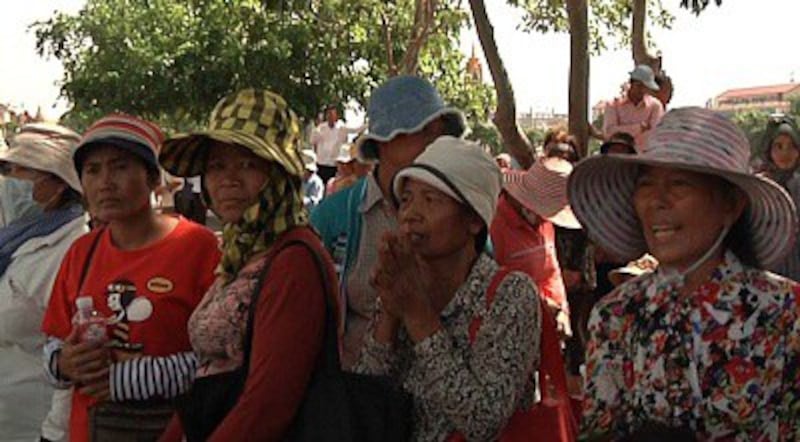Cambodian authorities have asked a court to review the jailing of 13 women involved in a land dispute as protests over their sentences escalated with over 100 demonstrators threatening Thursday to march on Prime Minister Hun Sen’s residence.
The Phnom Penh court has been asked to revisit the case of the jailed activists from the Boeung Kak lake community, Cambodian Foreign Minister Hor Namhong said, denying that the review was related to pressure from the U.S.
“I just received new information that the Ministry of Justice is requesting that the Phnom Penh Municipal Court resolve the case,” Hor Namhong told RFA in an interview Wednesday.
“This is not because of someone’s intervention; this is because of the government’s goodwill.”
U.S. Secretary of State Hillary Clinton had called on Cambodia to free the detainees in talks with Hor Namhong Tuesday, saying the activists’ release would be a sign of support for freedom of expression, according to a State Department spokesman.
The 13 women were jailed for between one year and two and a half years for their part in protests over land they say the government gave away in a concession to a private developer.
Two others, a man and a woman who were arrested May 24 on similar charges, were awaiting trial after they were denied bail on Thursday. They are being held at the same Prey Sar Prison as the group of women.
Hor Namhong said the government had previously been uninvolved in the case, adding that the activists had been arrested for abusing law enforcement officers.
“We let the court sentence them according to the law, but now we are working on the case,” he said.
Protest
Meanwhile in Phnom Penh, over 100 protesters including the jailed activists’ children gathered near Prime Minister Hun Sen’s home to deliver petitions calling for the activists’ release.
“I want him [Hun Sen] to release my relatives. He is the father of the country and the chair of ASEAN,” one Boueng Kak resident shouted, referring to the Association of Southeast Asian Nations, which Cambodia is chairing this year.
Cabinet official Kong Samroeun came out of the residence to accept the petitions.
The demonstrators insisted on marching to the prime minister’s house, but stopped after Kong Samroeun warned that police would take legal action.
Phnom Penh police had deployed about 50 officers to set road blocks preventing the protesters from the house.

Am Sam Ath, a senior investigator for the local rights group Licadho, said the demonstrators had appealed directly to the prime minister as a last resort.
“We hope that after he [Hun Sen] receives the petition, he will resolve the case,” he said.
According to Licadho, the government has given away nearly 4 million hectares (15,000 square miles), or 22 percent of the country’s land area, in mining or economic land concessions, in some cases pitting residents against developers and sparking protests as in the case of the Boueng Kak Lake.
About 400,000 people have been affected by the concessions, Licadho says.
Land concessions
The same day as the protest near his residence, Hun Sen addressed land concession issues in a speech broadcast on national television, ordering officials to give back land taken away from villagers.
He also ordered the Ministry of Agriculture to penalize companies that had encroached on villagers’ land.
“As long as Hun Sen continues to be the prime minister, the villagers will have the land,” he said.
“The opposition parties and NGOs can criticize, but Hun Sen has the right to make the decision,” he said.
It was the second time the prime minister has ordered the confiscation of land from companies who breached their concession contracts following a May 7 subdecree he issued outlining a temporary ban on new concessions.
Minister of Agriculture Chan Sarun said the officials are working in 18 provinces across the country to take back land from any companies that have had land disputes with villagers.
“Once we find out the number of the villagers who lost their land, we will give back the land,” he said.
Reported by RFA’s Khmer service. Translated by Samean Yun. Written in English by Rachel Vandenbrink.
